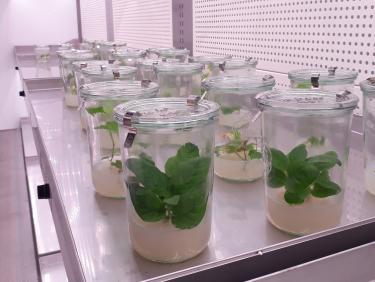Sustainability Research
With its breadth of institutions and competencies in the environmental sciences, Heidelberg University is well qualified to help formulate solutions to complex societal challenges such as global warming. Relevant research projects exist in the earth sciences, in geography, environmental physics, environmental economics, environmental law, environmental psychology and in the Biodiversity Research Unit, among others. The Heidelberg Center for the Environment (HCE) in particular brings together activities in the environmental sciences at Heidelberg University. In addition, scientists of the university contribute to a multitude of inter-university research networks that focus on sustainability and the environment.

Current Topics
Environmental Award of the Viktor and Sigrid Dulger Foundation
Her outstanding research achievements with great relevance to ecological research have earned the ecotoxicologist Dr Lisa Gölz the Environmental Award of the Viktor and Sigrid Dulger Foundation. The 2023 award pays tribute to her doctoral thesis at Heidelberg University on the effect of chemicals on the hormone system of fish, specifically on the thyroid.
Research Projects
The scientific investigation of questions surrounding sustainability requires a combination of different disciplinary perspectives. As a research university offering a broad range of subjects, Heidelberg University makes full use of its unique potential to address complex challenges through enhanced interdisciplinary cooperation. Consequently, it offers excellent conditions for research projects in the environmental sciences and related disciplines.
Heidelberg Center for the Environment
The Heidelberg Center for the Environment (HCE) is the hub of Heidelberg University’s network of competencies in the environmental sciences. Its goal is to provide the scientific tools needed to address the existential challenges and ecological impact of natural, technical and societal change on humankind across subjects and disciplines. Founded in 2011, the HCE was funded and developed as part of Heidelberg University’s institutional strategy in the second phase of the German Excellence Initiative. It is an essential part of the university’s Excellence Strategy – as one of three interdisciplinary incubators, it engages all parts of the university, initiates new research projects and assembles the required methods and technologies.
Links
Botanical Garden
As a scientific institution of Heidelberg University’s Centre for Organismal Studies (COS), the Botanical Garden is closely connected with the Department of Biodiversity and Plant Systematics. The garden is home to several thousand plant species. It is a place of scientific research and teaching and contributes to the preservation of endangered plants.
Biodiversity Research Unit
Heidelberg University’s Biodiversity Research Unit was founded in 2010 to investigate and address various aspects of biological diversity across subjects and disciplines. The unit deals with a wide range of questions, from basic research in evolutionary biology to the development of specific strategies of action for nature conservation and the protection of plant and animal species.
Institute of Environmental Physics
Research at the Institute of Environmental Physics deals with a number of subjects, including the physics of transport and mixing processes in the atmosphere, in the ocean, in groundwater and inland water bodies and in glaciers. The movements of water, dissolved substances and heat are another central building block of the institute’s research into current and past effects of global environmental and climate changes.
Research Center for Environmental Economics
The research Center for Environmental Economics at the Alfred Weber Institute for Economics is a common platform for economists conducting research at the intersection of environment and economics. The centre aims at developing theoretical, empirical and experimental methods that contribute to the formulation of potential solutions for a more sustainable use of the earth’s resources.
Research Center for Sustainable Development Law
This trans- and interdisciplinary research centre investigates legal questions relating to the principle of sustainability. It aims to build a theoretical body of work around the guiding principle of sustainability and ensure its usability in the application of law by defining and substantiating the concept of sustainability at the global, European, national, regional and local level.
TdLab Geography
The TdLab Geography at Heidelberg University’s Institute of Geography addresses socially relevant issues across the entire geographical spectrum from a transdisciplinary and application-oriented perspective. One of its focus areas is the field of ‘Geographies of Climate Change’. The lab works with partners from business, public authorities, politics and civil society to develop solutions to complex societal challenges.